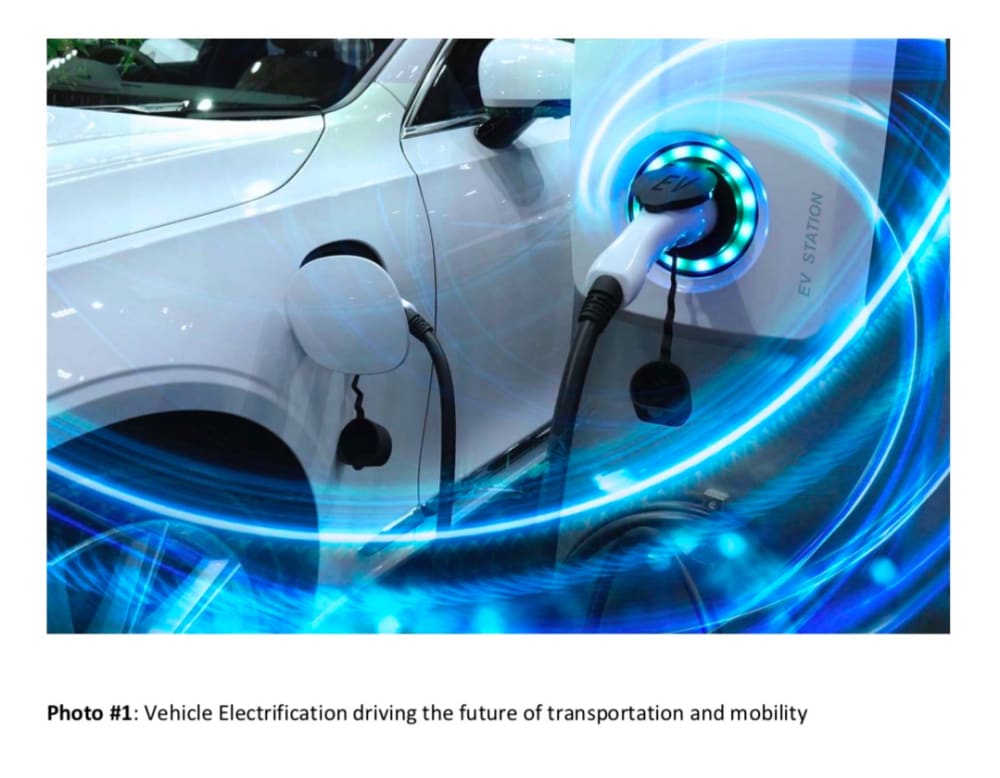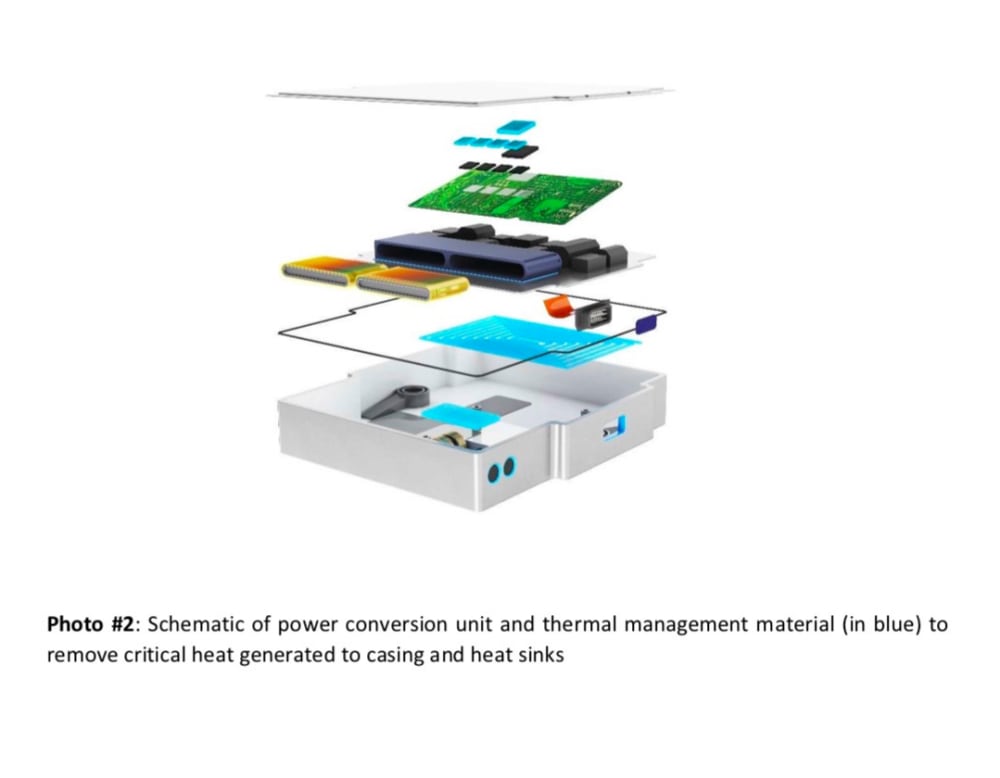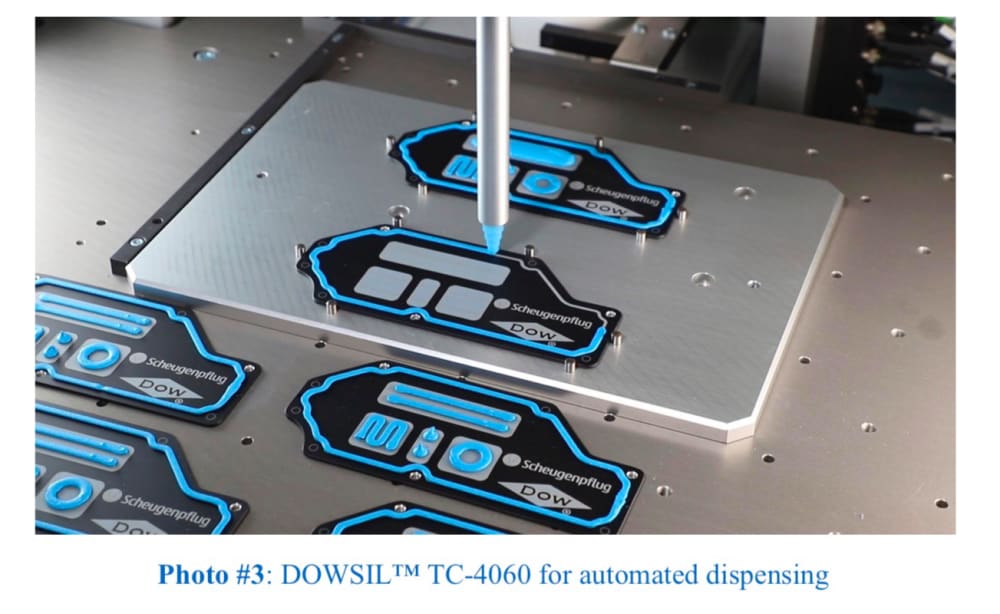
DOWSIL™ TC-4060 represents a step change in thermal management in automotive electronics, especially important in electric vehicles. Newer power electronics mandates improved efficiency, long-life and safety. TC-4060 provides (i) Significantly improved heat dissipation with higher thermal conductivity (ii) Long term retention of properties with patented stabilizers (iii) Controlled rheology with automated dispensing process leading to high manufacturing efficiency. Recently specified and used by leading Tier 1 and Auto OEMs, TC-4060 can power the coming generation of EVs. DOWSIL™ TC-4060 utilizes a proprietary, patent-protected rheology modifier and stabilization agent along with a unique ceramic nano and micron-sized filler set to provide reliable, thermally conductive pathways for intimate thermal contact between electronic components. The targeted silicone matrix optimizes viscosity through close filler-polymer interactions enabling high dispensability along with industry-leading 6W/mK thermal conductivity, low modulus and long-term reliability while drastically eliminating slumping, hardening, and cracking under harsh conditions.
While EV battery technology receives much attention due to the size and well-chronicled quest to lower cost and boost energy density, Inverter technology follows the same complexity and innovation trajectory. The critical, power-handling semiconductor components in Inverters, such as IGBT and MOSFET, manage voltage and provide temporary energy storage. Smaller, denser Inverters are required to make next generation EVs with improved drive efficiency and lower cost. DOWSIL™ TC-4060 Thermally Conductive Gel delivers an unmatched combination of high dispensability for ultra-fast precision dispense, ultra-low softness to cover a range of different electrical components while providing stress-relief and long-term reliability to survive harsh power electronics environments. With a transformational change in performance properties, TC-4060 offers significant benefits for consistent, efficient heat removal with long-life and reliability valued by Transportation customers. These advances are critical to maintain safety and efficiency of “cannot-fail” power electronics drivetrain applications and the future of EV’s. Working with leading robotic dispense and automation company Scheugenpflug led to efficient customer adoption of TC-4060. Dispense under constant high pressure showed no filler sedimentation or fluid separation, unlike other competitive technologies. This ensured ease-of-use and less waste for long term, automated dispense, a difficult achievement for highly filled, high thermally conductive gels.
-
Awards
-
 2022 Top 100 Entries
2022 Top 100 Entries
Like this entry?
-
About the Entrant
- Name:Hank Wu
- Type of entry:teamTeam members:Hank Wu, Senior Research Specialist
Yan Zheng, Associate Research Scientist
Dorab Bhagwagar, Principal Research Scientist
Otto Yang, Associate TS&D Scientist
Cathy Su, Associate TS&D Scientist
Florian Damrath, Associate TS&D Scientist
Jorge Lima, Associate TS&D Scientist
Thierry Cooremans, Lead TS&D Specialist
Donghui Huang, Senior TS&D Specialist
Shelly Shen, Senior Production Engineer
Diya Yu, Production Engineer
Cathy Tang, Quality Specialist
Nick Fan, Supply Chain Scheduling Specialist
Luc Dusart, Marketing Manager
Peter Wang, Senior Marketing Manager
Björn Jäger, Customer Manager
Khan Zhang, Customer Manager
Han Zhang, Senior Sales Specialist
Qi Chen, R&D/TS&D Technologist
Danhuan Ma, R&D/TS&D Technologist
Zhiting Liu, R&D/TS&D Technologist
Cassie Hale, Senior R&D/TS&D Technician - Profession:
- Hank is inspired by:Thermal management is critical for vehicle electrification. When vehicles accelerate, Inverters can get ‘frying-pan’ hot and need to dissipate ~ 250W of heat. Removal of this heat is critical for efficient and safe functioning. In order to solve these problem and meet customer requirements in EV market, Dow developed DOWSIL™ TC-4060 which delivered transformative combination of high thermal conductivity, conformability, patented dispensability, and long-term stability to enable smaller, denser Inverters required in next generation EVs with improved drive efficiency and lower production cost.
- Software used for this entry:No
- Patent status:patented








